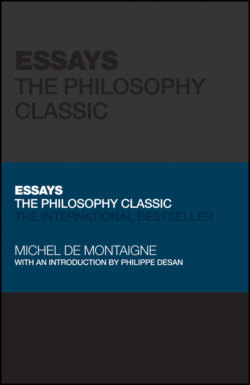Читать книгу Essays - Michel de Montaigne - Страница 12
MY WORLD, NOT THE WORLD
ОглавлениеMontaigne makes the conscious decision to describe the world in its multifaceted representations rather than seek to show some prescriptive overlying order. The world is always his world, nothing more. Judgment cannot be generalized or imposed on others. For this reason, civilizations must be understood on their own terms and should not be judged according to their “advancements” in relation to other civilizations. On this point, Montaigne is very critical of the conquest of the New World and its accompanying moral discourse. He prefers to imagine himself on the other side of what he observes, so that he can understand fully what it feels like and means to be different.
The more he looks at customs around the world, the more he doubts that humans can be generalized into a single essence. He excels at describing his own existence (with its particular experiences) in relation to other existences and develops his method of distingo: understanding oneself first, one can begin to understand others. This interactionist principle of human existence defines Montaigne's writing – and it is an approach we should take seriously, today more than ever.
Starting from a materialist perspective (the existential conditions observable throughout the world and universe), Montaigne realizes that the body is the foundation for all knowledge, and that the mind itself is inseparable from the body:
“Is it not a ridiculous attempt for us to forge for those to whom, by our own confession, our knowledge is not able to attain, another body, and to lend a false form of our own invention; as is manifest in this motion of the planets; to which, seeing our wits cannot possibly arrive, nor conceive their natural conduct, we lend them material, heavy, and substantial springs of our own by which to move…” (Book II, Chapter 12).
Human experience has limits, which is where the mind comes in. In this crucial moment – one that defines “modernity” – knowledge thus depends on both the experiences of the body and the conceptualizations of the mind. They cannot be separated. However, epistemologically, this harmony between what Descartes will call “common sense” (reason) and the senses does not last long. In the seventeenth century they are separated to create modern philosophy, which in its abstractions relegates the senses and the body to “noise”.
